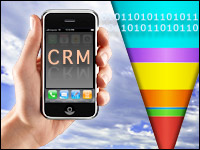
2013: The Year of Mobile CRM, Part 1
2013 is just two weeks old, but executives in the mobile CRM space have a clear idea of how they hope the rest of it will unfold. What they want, in a word, is more: more mobile CRM functionality; availability on more devices; more vendors supplying applications.
More mobile CRM is indeed on the way as economic growth picks up, said Atri Chatterjee, CMO of Act-On.
Remote Revolution
One of the factors driving mobile CRM this year will be companies hiring more remote workers, he told CRM Buyer.
Companies will need little urging to equip these new workers with mobile CRM applications, said Chatterjee, because mobile CRM “increases worker productivity, allowing work to be accomplished on the fly.”
The expected growth in the number of CRM mobile users will have its own set of ramifications. The mobile CRM experience is already trending to a simplified, role-based CRM user experience — a trend that is expected to accelerate this year.
“Different types of users will have vastly different mobile experiences based on a specific role,” Bob Lam, national CRM solutions lead at RBA, told CRM Buyer. “This will provide the mobile user access to relevant data where and when it is necessary.”
Who’s a Knowledge Worker?
2013 will also be the year during which mobile CRM makes a serious play for the B2B user.
“Traditionally, the term ‘CRM’ has been associated with lead tracking and post sales customer service,” Ray Grainger, founder and CEO of Mavenlink, told CRM Buyer.
“In the past, customers were happy to simply receive weekly or monthly status reports on how their projects were progressing. Now they want transparent communication, live project updates and status reports anytime, anywhere,” he said.
In short, clients expect to be able to communicate via their devices at all times, check project statuses, upload files, and add or approve expenses, budgets and invoices.
This type of B2B functionality will extend beyond typical business industries to the “blue collar” sector, predicted Michael Idinopulos, chief customer officer of Socialtext.
“To date, companies have built mobile apps primarily for their desk-bound, white-collar employees,” Idinopulos told CRM Buyer.
“This year, we will see an explosion of companies launching dedicated apps for employees who work on their feet,” he said. “Manufacturing, transportation, hospitality and utilities will get in the enterprise social game in a big way, challenging traditional notions of who is and isn’t a ‘knowledge worker.'”
A Changing Form Factor
2013 will also see a shift in the definition of what “mobile” actually is — or at least a blurring of its current definition.
“Phones are getting bigger, and tablets are getting smaller,” Dan Roche, VP of marketing for TalkPoint, told CRM Buyer. “At some point, there will be no difference. The Nexus 7 tablet has a 7-inch screen, and the Samsung Note II has a 5.5-inch screen, with rumors of an even bigger 6.3-inch version coming in 2013.”
The industry is evolving to the point where people are going to choose a “phone” or a “tablet,” and it may not be necessary to have both.
For the most part, though, mobile computing will stay within its current definition this year. Trends that began to emerge last year and in 2011 — especially the emergence of tablets — are still unfolding.
Tablets are increasingly replacing home desktops and laptops, and are being used as the go-to device outside of the office, noted Thomas Murphy, director of enterprise marketing and client relations for TheLadders.
“This year, we will see a tremendous rise in mobile apps from already-established CRM systems, which will allow businesses to manage and effectively support their clients via tablets,” he told CRM Buyer.
“These new and innovative apps will enable organizations to effectively arm their employees with technology that is specifically designed to work on the ever-growing device of choice,” said Murphy. “In fact, developing for device agnosticism will reign in 2013.”
























































